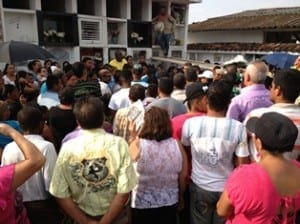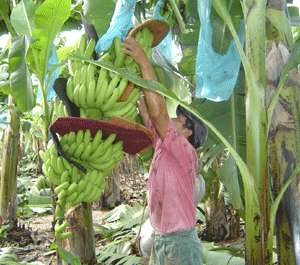Feb 5, 2013

Family and friends attend the funeral of slain trade unionist, Juan Carlos Pérez Muñoz. Credit: Robinson Cook
Juan Carlos Pérez Muñoz, a trade union member in Colombia, was gunned down last week on his way to board a bus to the Cauca River Valley where he worked in the sugarcane fields.
The death of Pérez, 30, a leader in the SINTRAINAGRO union’s struggle for living wages and decent working conditions at the La Cabaña sugar plantation, came just days after two rallies by sugarcane workers. The workers were protesting the firing of 87 employees of the La Cabaña and 24 employees Maria Luisa plantations. Since December, when the sugarcane workers collectively began pushing for workplace improvements through SINTRAINAGRO, workers have been subjected to threatening phone calls and other forms of harassment, and the company has refused to negotiate.
“Anti-union violence and the victimization of the workers is still growing,” the union federation CUT (Central Unitaria de Trabajadores de Colombia), said in a statement. In Colombia, “the rights of workers continue to be violated,” CUT Human Rights Director Alberto Vanegas Zuluaga, told Colombia Reports.
Sugarcane development is a thriving business in Valle del Cauca. Nearly half its cultivated area is devoted to sugarcane production as either raw sugar or ethanol, about one-third of it for export. Sugarcane cutters work as long as 14 hours per day and make as little as $200 a month. Because they are largely subcontracted, they receive no health care or pensions and must provide their own safety equipment—and have no recourse if they are injured on the job.
Colombia remains the deadliest country for union leaders and members. In 2012, 19 trade unionists were murdered and there were at least 10 attempted murders, according to the Colombian non-governmental organization, Escuela Nacional Sindical. The International TradeUnion Confederation (ITUC) says that although some efforts have been made to investigate these crimes, the majority of the cases reported by trade union organizations remain unsolved.
In recent meetings with the Minister of Labor and the Minister of the Interior, SINTRAINAGRO and CUT denounced the violence and threats to leaders and members of the sugarcane workers’ union and to SINTRAINAGRO’s national leadership and asked the governmentto provide protection. They made clear that without government protection, more unionists would be killed. Perez was gunned down a few days later, leaving behind his wife, Luz Aidé, and son.
Feb 1, 2013

A Guatemalan banana worker.
Since 2007, 64 trade unionists have been murdered in Guatemala, and hundreds more union leaders and members have been kidnapped, tortured and threatened with death—all part of an ongoing pattern of violations against worker rights, according to Britain’s Trade Union Congress (TUC). Only a small fraction of these incidents have been investigated, and 98 percent of these crimes have not been punished.
Over the past 20 years, the international community has appealed to the Guatemalan government to address serious human rights violations, to little effect. The TUC now is adding its voice in urging the International Labor Organization (ILO) governing board to establish a special inquiry commission—its highest investigative body—to push for needed reforms. Last June, 10 worker delegates to the ILO’s Labor Conference, from Asia, Africa, Europe, and the Americas, filed a request with the ILO for such a commission.
Guatemalan unions have sent detailed recommendations for improved labor rights compliance to its government, filed under the Dominican Republic-Central American Free Trade Agreement (DR-CAFTA) complaint process. In 2008, six Guatemalan trade unions filed a complaint about the suppression of worker rights under the trade agreement. The case advanced to the disputeresolution phase in 2011 and is still pending.
Members of Guatemala’s Union of Izabal Banana Workers (SITRABI) are particularly threatened. In 2011, four of the 10 trade unionists murdered in Guatemala were from SITRABI, a long-time Solidarity Center partner, and the murder of SITRABI members continued into 2012. The International Trade Union Confederation (ITUC) 2012 Survey of Trade Union Rights described Guatemala as “characterized predominantly by human rights violations,” as the “right to life of trade union, rural and indigenous community leaders and human rights defenders continued to be violated.”
Meanwhile, the Guatemalan government has for several decades supported the maquila (light manufacturing) industry through tax holidays and the failure to enforce its labor laws. Any company exporting more than 51 percent of production can be classified as a maquila and so qualify for significant tax breaks. Although the law requires businesses to respect labor law to receive tax breaks, employers are rarely penalized for retaliating against workers who seek to form unions, even though employer tactics include targeted or mass firings, death threats, blacklists or plant closings (and sometimes reopening elsewhere under a new name).
For example, at the Ternium aluminum processing plant in Villa Nueva, Emeterio Nach was among workers fired in recent months after seeking to form a union. “Management used to tell us they can do whatever they want with the workers,” said Nach, speaking through a translator. “They didn’t care about the Ministry of Labor or inspections or anything. I could never take a day off.”
Nach’s experience is all-too common for Guatemalan workers who, when seeking to improve their wages and working conditions, lose their jobs and, sometimes, their livees.


